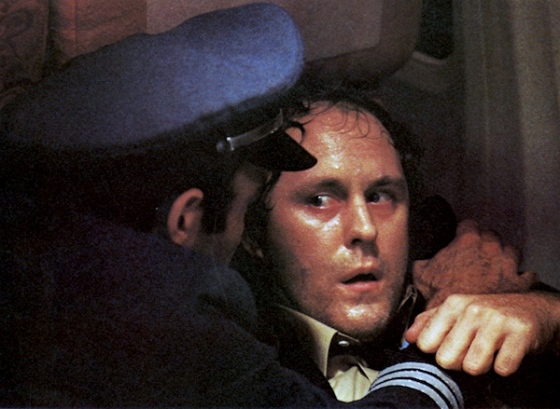Horror, comedy, romance, and singing Nazis in this week’s roundup…
(2009)
Jac Schaeffer | 100 mins | streaming (HD) | 1.85:1 | USA / English & Spanish | 15 / R

The debut feature of writer-director Jac Schaeffer (who hasn’t helmed a feature since, but is now the showrunner of Marvel’s WandaVision) is a sci-fi romcom that doesn’t sell out its high concept to make its romance work. Said concept is that you can buy an implant that will count down to the day when you meet your soulmate. So, there’s the usual romcom “will they/won’t they” shenanigans, but with this added SF complication.
As a sci-fi fan, I thought the concept was very well done indeed. At it’s core it’s quite a simple idea — I mean, such a device is hardly something that would change the entire world, but it would certainly affect our attitude to relationships and dating. The writing has thought through those effects, the way it would modify people’s reactions and behaviour and so on, and applied all of that to its story in a natural way; that is to say, it influences what happens, rather than the plot being little more than an exercise in exploring the permutations of the concept. Couple that with a solid romcom element, and you have a likeable little film.

(1977)
Dario Argento | 98 mins | Blu-ray | 2.35:1 | Italy / English | 18

Perhaps horror maestro Dario Argento’s best-known movie, Suspiria is the story of American ballet dancer Suzy Bannion (Jessica Harper), who travels to Germany to train at a prestigious dance academy, where she instead uncovers many creepy goings-on.
There’s a bit more to the story than that, but, really, Suspiria is more about its unnerving atmosphere, creepy scares, and strikingly brutal murders than emphasising a traditional narrative. According to the film’s Wikipedia page, “film scholar L. Andrew Cooper notes ‘aesthetic experience is arguably the ultimate source of ‘meaning’ in all of Argento’s films’,” and that was certainly my main takeaway here — as I wrote in my year-end summary, it’s a masterpiece of uneasy atmosphere, with striking colours and music.
There’s a lot more that could be written about Suspiria (and, of course, has been written in the 43 since its release), but if you were expecting deep-dive insight in a roundup column, you’re in the wrong place.

Suspiria placed 16th on my list of The Best Films I Saw in 2018. It was viewed as part of Blindspot 2018.
(1993)
Joe Dante | 99 mins | TV | 1.85:1 | USA / English | PG / PG

I confess I’d not even heard of Matinee before Arrow put out a Blu-ray a few years back, but it seems to be something of a cult favourite — it’s laden with high-scoring reviews on Letterboxd nowadays. It’s about a producer of horror B-movies (modelled on William Castle) who attempts to promote his latest piece of monstrous schlock, Mant, to a military-base town during the Cuban Missile Crisis. Thematically, it’s a tribute to and evocation of the magic of the movies, which probably explains its popularity on a movie-logging website. That’s definitely its strongest aspect, with John Goodman getting to deliver some nice speeches about the wonder of going to the pictures. Shame today’s cinema managers and employees don’t seem to share his romanticism for the experience…
Other than that, I thought it was a bit something and nothing. The movie-within-a-movie is a lot of fun, and setting a good chunk of the film during its premiere screening is a neat bit of structure, but overall the antics get a bit daft.
There’s a bit of unintended mirroring in the inclusion of a school drill for the atomic bomb about to drop, with safety precautions that would be fundamentally useless were it to actually happen — it calls to mind how today US schools do drills for school shooting situations, again with virtually useless advice (or so I’ve heard). You could possibly draw out some commentary on the changing nature of threats to US citizens (it used to be from without, now it’s from within), but Matinee was made in 1993, so the chances of it being intentional are nil.

(1967)
Mel Brooks | 86 mins | DVD | 1.85:1 | USA / English | PG / PG

Writer-director Mel Brooks is best known for his fourth-wall-breaking movie parodies like Young Frankenstein, Spaceballs, and Robin Hood: Men in Tights, but his debut feature is a different kettle of fish. It takes place in (broadly speaking) the real world, where failing Broadway producer Max Bialystock (Zero Mostel) and accountant Leopold Bloom (Gene Wilder) come up with a moneymaking scam that involves putting on a show so terrible that it closes on opening night.
Cue a mix of black humour (the play they settle upon is called Springtime for Hitler: A Gay Romp with Adolf and Eva at Berchtesgaden) and slapstick, with scenes and moments indicating the direction Brooks’ style would later take (like an aside about another character being delivered direct to camera, or someone answering a comforting “there, there” with “where, where?”).
Although originally opening to mixed reviews, the film was a box office hit, earnt Oscar nominations (Best Supporting Actor for Wilder) and wins (Best Screenplay for Brooks), and was eventually adapted into an actual Broadway musical (you couldn’t make this up) which was then (re)made as another film (you really couldn’t make this up) and as recently as 2016 was used as the basis for a spoof of Trump (sadly, he’s not made up either). That, I think, speaks to the enduring hilarity of the original.






